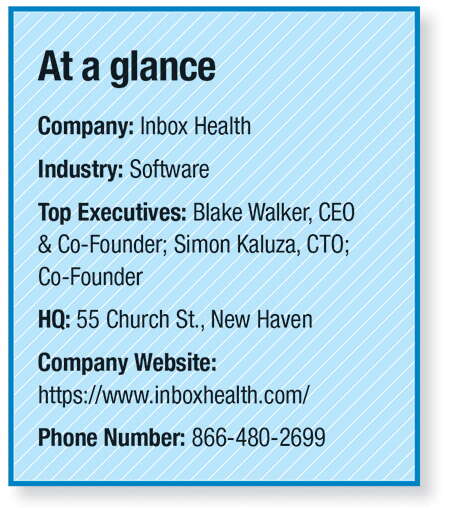
Processing Your Payment
Please do not leave this page until complete. This can take a few moments.
-
News
-
Editions
-
- Lists
-
Viewpoints
-
HBJ Events
-
Event Info
- 2024 Economic Outlook Webinar Presented by: NBT Bank
- Best Places to Work in Connecticut 2024
- Top 25 Women In Business Awards 2024
- Connecticut's Family Business Awards 2024
- What's Your Story? A Small Business Giveaway 2024 Presented By: Torrington Savings Bank
- 40 Under Forty Awards 2024
- C-Suite and Lifetime Achievement Awards 2024
- Connecticut's Health Care Heroes Awards 2024
-
-
Business Calendar
-
Custom Content
- News
-
Editions
View Digital Editions
Biweekly Issues
- April 15, 2024
- April 1, 2024
- March 18, 2024
- March 4, 2024
- February 19, 2024
- February 5, 2024
- January 22, 2024
- January 8, 2024
- Dec. 11, 2023
- + More
Special Editions
- Lists
- Viewpoints
-
HBJ Events
Event Info
- View all Events
- 2024 Economic Outlook Webinar Presented by: NBT Bank
- Best Places to Work in Connecticut 2024
- Top 25 Women In Business Awards 2024
- Connecticut's Family Business Awards 2024
- What's Your Story? A Small Business Giveaway 2024 Presented By: Torrington Savings Bank
- 40 Under Forty Awards 2024
- C-Suite and Lifetime Achievement Awards 2024
- Connecticut's Health Care Heroes Awards 2024
Award Honorees
- Business Calendar
- Custom Content
Inbox Health eyes continued growth as pandemic wanes
 PHOTO | CONTRIBUTED
PHOTO | CONTRIBUTED
When it comes to understanding medical billing, New Haven-based Inbox Health founders Blake Walker and Simon Kaluza take the guesswork out of the equation for patients and providers alike.
"Our goal with patients is to make it easy for them to understand the cost and their coverage," Walker said.
That goal has helped capture the eye of several investors over the past three years, as Inbox Health has carved out its piece of a niche market that merges financial technology (fintech) and health care.
Since launching in 2014, the startup has raised $22.8 million in venture funding and grown from a handful of employees — Walker and Kaluza included — to a roughly 50-person team of in-person and remote workers.
Inbox Health has helped bridge the communication gap between medical practices and patients with a digital platform for medical billing companies that uses text messaging, email and voice technology. It also offers technology-enabled mailings to help billing companies and, by extension, physician practices connect with patients to more clearly explain and collect out-of-pocket costs.
"We wanted to start a company that ... helps make it a conversation from start to finish, rather than this obscure medical bill that just winds up in your hands if you're lucky," Kaluza said.
Pandemic-induced tailwinds
Pandemic-induced shutdowns and restrictions in 2020 initially hampered some of Inbox Health’s clients, but that didn't stall the startup's upward trajectory.
"It's been a fun year, with a lot of growth and change and expanding into our new New Haven office on Church Street downtown," Walker said.
Increased remote working also served as a boon for the startup’s recruiting efforts.
"The pandemic made us rethink what was important to us,'' Walker said. “We were able to recruit a caliber of employees that was comfortable working remotely in a way that we just couldn't before."
A residual benefit has been increased confidence in investors as the company enjoyed growth during the pandemic. According to Walker, roughly 20 of Inbox Health's employees were hired in the past couple of months.
Inbox Health announced in April that it completed a $15 million Series A financing round, led by San Francisco-based Commerce Ventures. Walker said the funding will be primarily focused on growing the business.
"It's a niche, but 150,000 healthcare providers in the U.S. are impacted by this space," he said.
Funding will also be allocated to marketing and sales to expand Inbox Health's customer base.
The New Haven startup serves 1,200 medical practices and has roughly 1 million patients using its platform annually to manage and pay for their medical expenses.
Addressing the pain points
Inbox Health's earlier years were spent operating in obscurity as Walker and Kaluza worked to mitigate medical billing challenges for providers and patients.
"The long and short of it was that there were particular pain points around how billing companies needed to engage consumers at a larger scale but still working with these smaller practices, so we focused on them, and that gave us a better angle in the market," said Walker.
Walker had designed bill payment and financing products, while Kaluza had worked as a software engineer at 3M.
In 2014, Kaluza got a first-hand look at many of the challenges medical providers and patients deal with in the billing process after his mother had been diagnosed with ALS and he was one of her primary caregivers.
"One of the core tenets of Inbox Health that I drew heavily from my experience caring for my mother is providing real-time and bi-directional communication when it comes to understanding why and how you owe something," Kaluza said.
Inbox Health’s technology caught the eye early on of Connecticut Innovations, the state's venture capital arm, which led a $1.5 million round of seed funding for the company in 2017.
"The percentage of the healthcare bill that was being borne by the patient was increasing," said Matthew Storeygard, a CI managing director. "There were higher out-of-pocket costs and higher patient responsibilities, and doctors didn't have the tools to collect from patients efficiently and in a way that was consumer-friendly, and that was sort of what we saw, or that was the initial appeal."
As health care continues to play a more significant part in the U.S. economy, Storeygard said Inbox Health's platform could move digital health care in a positive direction.
"I think it's still true today," Storeygard said. "They are providing consumer-grade tools to help collect the patient portion of the bill, which is a huge part of health care."
New Haven loyalty
While continued growth and development are top priorities, Walker and Kaluza say they want to stay loyal to their Connecticut roots.
"When we raise venture capital from firms in the West Coast, and they ask where you are, and you say New Haven they kind of look at you with a confused face and ask ‘why,’" Walker said, adding that they’ve been asked to relocate to San Francisco in the past.
Walker said the pandemic’s impact has helped change investors' perspectives on the matter.
"For us at least, both Simon and I were born in New Haven," Walker said. "My parents and grandparents had businesses in New Haven, and it was pretty intentional for us to put down roots here and say, 'we are going to build this business here.’
"It's important to us that we are growing this business in New Haven and that we are building this ecosystem of software companies in New Haven that is small but growing," Walker continued. "It can be a great part of the New Haven economy that has room to grow. There is a lot of talent in that area that is untapped, and I think it's important to us to see if we work as part of the community and be a part of its potential."


2022 Giving Guide
This special edition informs and connects businesses with nonprofit organizations that are aligned with what they care about. Each nonprofit profile provides a crisp snapshot of the organization’s mission, goals, area of service, giving and volunteer opportunities and board leadership.
Learn more
Subscribe
Hartford Business Journal provides the top coverage of news, trends, data, politics and personalities of the area’s business community. Get the news and information you need from the award-winning writers at HBJ. Don’t miss out - subscribe today.
Subscribe
2024 Book of Lists
Delivering Vital Marketplace Content and Context to Senior Decision Makers Throughout Greater Hartford and the State ... All Year Long!
Read Here-
2022 Giving Guide
This special edition informs and connects businesses with nonprofit organizations that are aligned with what they care about. Each nonprofit profile provides a crisp snapshot of the organization’s mission, goals, area of service, giving and volunteer opportunities and board leadership.
-
Subscribe
Hartford Business Journal provides the top coverage of news, trends, data, politics and personalities of the area’s business community. Get the news and information you need from the award-winning writers at HBJ. Don’t miss out - subscribe today.
-
2024 Book of Lists
Delivering Vital Marketplace Content and Context to Senior Decision Makers Throughout Greater Hartford and the State ... All Year Long!
ABOUT
ADVERTISE
NEW ENGLAND BUSINESS MEDIA SITES
No articles left
Get access now
In order to use this feature, we need some information from you. You can also login or register for a free account.
By clicking submit you are agreeing to our cookie usage and Privacy Policy
Already have an account? Login
Already have an account? Login
Want to create an account? Register
Get access now
In order to use this feature, we need some information from you. You can also login or register for a free account.
By clicking submit you are agreeing to our cookie usage and Privacy Policy
Already have an account? Login
Already have an account? Login
Want to create an account? Register






0 Comments